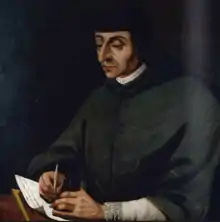Francisco Cervantes de Salazar
Francisco Cervantes de Salazar (1514? – 1575) was a Spanish man of letters and rector of the Royal and Pontifical University of Mexico, founded in 1551.

He was born and raised in Toledo, Spain. He first attended Alejo Venegas’s Grammar School and then studied at the University of Salamanca. In 1539 he accompanied Licenciado Pedro Giron to the Low Countries where he met Juan Luis Vives. In 1546 he published a collection of three works, Apólogo de la ociosidad y el trabajo by Luis Mejia, Introducción y camino de la sabiuduría by J. L. Vives, and Diálogo de la dignidad del hombre by Pérez de Oliva, which Cervantes completed by adding almost two-thirds to the original draft by Oliva.
After spending the first part of his life in Spain, he went to Mexico around 1550, and lived there until his death. He had a successful academic career in the recently founded University of Mexico, and was appointed rector twice. He published a collection of Latin dialogues describing the city of Mexico in 1554 [1] and left unfinished a chronicle of the Mexican conquest (Crónica de la Nueva España, about 1560), which remained unpublished until 1914.[2] Recently, it has been suggested that he may be the author of the first picaresque novel, La vida de Lazarillo de Tormes (1554).
References
- Francisco, Cervantes de Salazar (1875). México en 1554. Tres diálogos latinos que Francisco Cervántes Salazar escribió é imprimió en México en dicho año [Mexico in 1554. Three Latin dialogues that Francisco Cervántes Salazar wrote and printed in Mexico in that year]. México: Andrade y Morales. OCLC 1049881217.
- Francisco, Cervantes de Salazar (1914). Magallón, M. (ed.). Crónica de la Nueva España [Chronicle of New Spain] (in Spanish). Madrid: Hispanic Society of America. OCLC 1042916880.